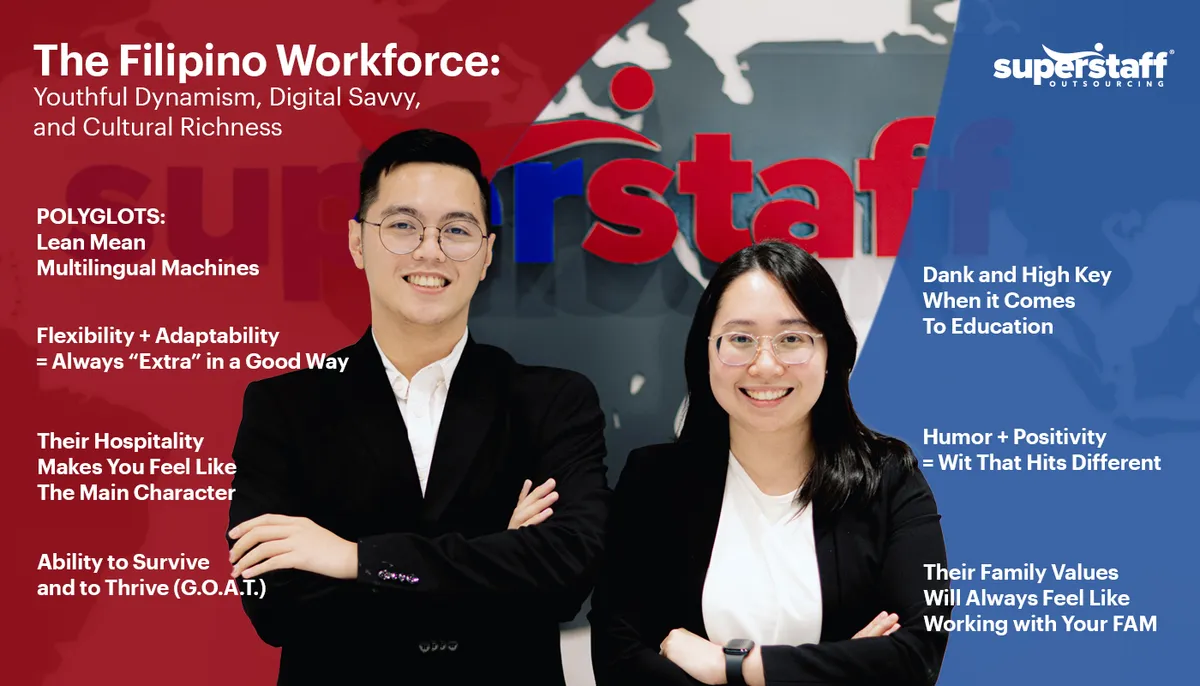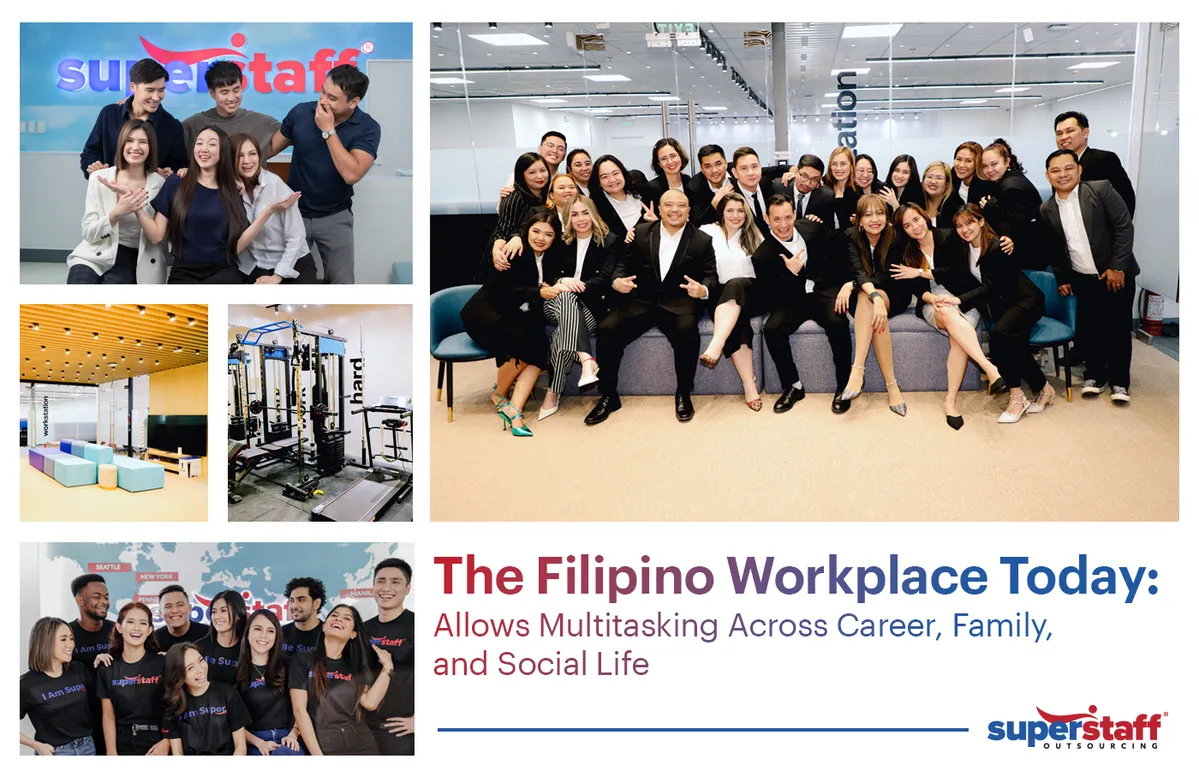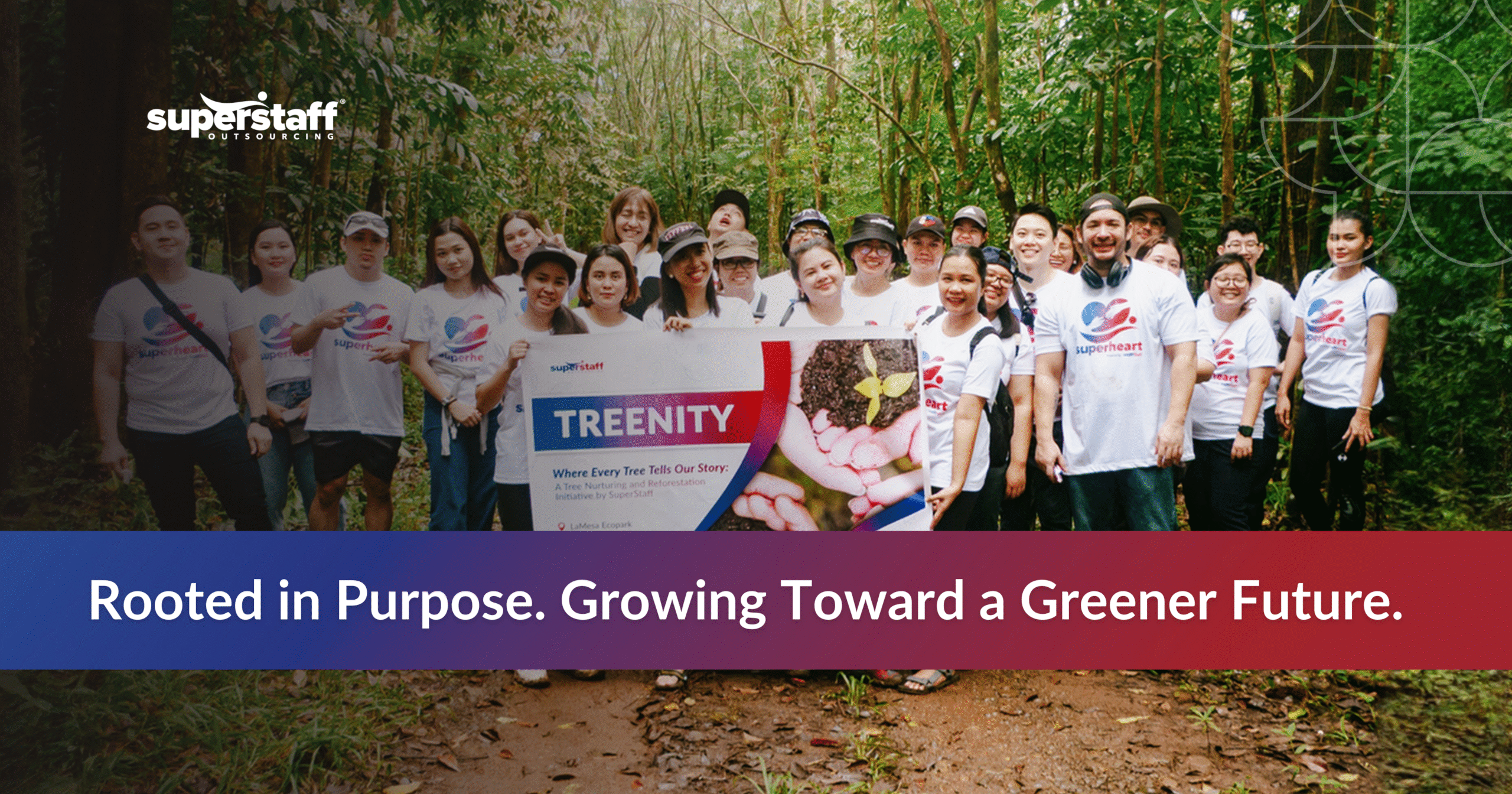
You may know Filipinos for their excellent singing ability (and singers like Bruno Mars, Nicole Scherzinger, and Olivia Rodrigo), the world-famous food chain Jollibee, beauty pageantry competitiveness, and the country’s virgin islands. But there’s more to this tropical country than just fried chicken and famous singers. This Southeast nation, which reigns as the Call Center Capital of the World, boasts an intricate tapestry of culture, resilience, and innovation.
With a young, skilled, and English-proficient workforce, the country has become a hub for the Business Process Outsourcing BPO industry, particularly in customer support, technical support, and other business processes.
The bustling call centers that operate around the clock contribute significantly to the country’s economic growth and have positioned the Philippines as a critical player in the global outsourcing landscape.
Call Center Philippines Today
The most recent Offshore BPO Confidence Index revealed that the Philippines’ labor market is highly regarded (84.9%) for its abundance of front-line agents and supervisors. The country is also rated highly across other measures, such as infrastructure (75.8%), commercial property (88%), the BPO ecosystem (76%), and public security (75%).
This means that business leaders, industry experts, and other stakeholders have high confidence in the country’s ability to support its local call center industry sustainably.
The Filipino Today: Young and Vibrant, Digitally Sophisticated, Culturally Diverse

The Philippines has roots deeply embedded in Indo-Malayan heritage and enriched by Chinese and Islamic influences.
With a rich Spanish, American, and Japanese colonization history, Southeast Asian culture uniquely blends Western and Eastern cultures. This cultural interplay doesn’t just stay confined to history and culture; it effortlessly trickles down to the heartbeat of the nation — its young, vibrant workforce.
From office discussions in diverse languages to innovative work practices driven by the latest tech trends, the Filipino workforce reflects the adaptability and openness of embracing many cultural influences.
Dank and High Key When It Comes to Education
The nation prioritizes education through state-funded primary, secondary, and tertiary education — a testament to the belief that education is the key to unlocking success.
The education sector has transformed to keep pace with the ever-evolving global markets, adding two more years to the secondary education system.
Senior high school students now have the opportunity to tailor their learning experience to match their passions by choosing between tracks like science, technology, and math (STEM), humanities and social science (HUMSS), and accountancy and business management (ABM).
The country’s commitment to learning diversity is also impressive. Beyond the mainstream, the education sector embraces the unique needs of different demographics through schools such as the following:
- International schools
- Chinese schools
- Islamic schools
- Alternative Learning Systems (ALS)
- Specialized schools catering to differently-abled individuals
Holistic education resonates across all sectors, creating spaces where learners feel seen, heard, and empowered to thrive. The result? A high literacy rate (97%), English proficiency, and a rich educational landscape prepare students for the workforce.
Polyglots: Lean, Mean, Multilingual Machines
Most Filipinos effortlessly navigate three or more languages, including their mother tongue, the national language, Filipino, and the global lingua franca, English. This linguistic finesse is a testament to the success of the country’s Bilingual Education Policy introduced in the 80s.
As polyglots, their innate ability to break linguistic barriers makes them a force to be reckoned with in the global market. With Western cultural influences and English in their curriculum, Filipinos seamlessly integrate into international environments.
The country is also a linguistic goldmine, boasting more than 170 languages. This diverse linguistic landscape is a nod to the country’s rich culture rooted in native languages from Malayo-Polynesian languages.
Humor + Positivity = Wit That Hits Different
If you know Jo Koy, the stand-up comic who recently hosted the Golden Globes, you probably know he is a Filipino, as most of his jokes are about his experiences as a Fil-Am (Filipino-American) growing up in the United States. Like Jo Koy, Filipinos are also big on humor.
What makes their humor truly special is its sunny outlook. The Philippines is ranked the second happiest country in Southeast Asia. Due to their ability to see humor in the most mundane moments, they are not afraid to make fun of themselves — evident in the viral memes and funny TikTok clips that only a true-blue Pinoy will enjoy.
In the heart of Filipino households, humor takes center stage. It’s a shared experience that strengthens family bonds and transforms daily routines into memorable anecdotes.
As such, every Filipino workplace is a positive environment where humor is not just a byproduct but an integral part of the organizational culture. It’s a place where people look forward to being a part of each day.
Flexibility + Adaptability = Always “Extra” in a Good Way
Filipino adaptability can be traced back to the Philippines’ complex colonial history. Having been influenced by Spain, the United States, and Japan, they have developed a natural openness to assimilating new ideas, customs, and perspectives.
Trade and migration have also played significant roles in honing their adaptability. Positioned strategically in the region, the Philippines is a crossroads of diverse cultures. Exposure to people from different parts of the world has instilled an open-mindedness and a genuine curiosity about other cultures.
The global diaspora of Overseas Filipino Workers (OFWs) further exemplifies this adaptability. From the Middle East to North America, they seamlessly integrate into various cultures while maintaining strong ties to their roots — a hallmark of the Filipino experience abroad.
Filipinos can navigate diverse professional landscapes by collaborating with multinational corporations or participating in international teams.
The influence of global media and pop culture has also played a role in broadening the perspectives of Filipinos. Movies, television shows, music, and the internet have enriched their understanding of the world, contributing to their adaptability on a global scale.
Discipline + Hard Work = They Slay All the Way
Filipinos are revered across the globe for their unwavering commitment to hard work, discipline, and persistence. These qualities have contributed significantly to the nation’s reputation for producing dedicated and reliable employees.
An ingrained sense of diligence is at the core of their world-renowned work ethic. From nurses and domestic workers to office employees in the rapidly expanding BPO industry, Filipinos always go the extra mile, ensuring tasks are not just completed but executed with excellence.
The Bayanihan culture, rooted in the tradition of community coming together for a common goal, is reflected in the workplace. Filipinos exhibit a collaborative spirit, willingly offering assistance and working together to achieve shared objectives.
Their extraordinary work ethic has not gone unnoticed by international employers. Many international companies actively seek Filipino talent from the service industry to corporate settings.
For instance, Filipino nurses are highly sought after in the UK, with a Filipino nurse administering the country’s historic first COVID-19 vaccine dose. Their reliability, dedication, and collaborative mindset make Filipino work ethic the gold standard in the global job market.
Their Hospitality Makes You Feel Like the Main Character
Hospitality is second nature to Filipinos. No matter where you are, if you go into a Filipino household, you will be welcomed with a pair of slippers, a hot meal, and a refreshing beverage. They treat guests not just as visitors but as cherished family members.
This unique trait extends beyond their homes, playing a critical role in industries where compassionate care and hospitality are vital. For instance, many Filipinos choose to pursue careers in healthcare, not merely as a profession but as a calling.
Filipinos excel as hosts, hoteliers, and service professionals in the hospitality industry. The commitment to making others feel comfortable and valued is the natural progression of their cultural hospitality.
This also translates to the contact center industry, which is why many companies — from small businesses to industry giants — outsource to the Philippines. Filipino agents are known for their excellent communication skills and robust customer-centric approach. They are valued for their politeness, patience, and empathy, effectively handling customer inquiries and complaints and providing assistance/
Ability To Survive and Thrive (G.O.A.T.)
Nestled in the heart of the Pacific Ring of Fire, the Philippines is a testament to resilience in the face of nature’s unpredictable dance. Despite the beauty of Mt. Taal’s lake views and Mt. Mayon’s perfect cone, make no mistake: these active volcanoes are hazardous.
The country faces the relentless onslaught of tropical cyclones in the Typhoon Belt. As if that weren’t enough, the challenges escalate with the daunting specters of climate change.
Yet, despite these challenges, the Filipino spirit remains unbroken. Resilience is a way of life for them. It’s the courage to rebuild homes from the rubble, the determination to rise above floods, and the unwavering spirit that refuses to be defined by the challenges at hand.
In every disaster, there’s a narrative of Bayanihan and collective strength. Filipinos don’t just weather the storm; they emerge from it with a renewed sense of community and an indomitable will to rebuild.
Resilience is not just a trait born out of necessity. It’s a cultural cornerstone for the Filipinos. While the Philippines may be one of the most disaster-prone countries, it is also a beacon of resilience, reminding the world that strength is not always measured by avoiding challenges but by bravely facing them and emerging stronger on the other side.
Their Family Values Will Always Feel Like Working With Your FAM
For Filipinos, family is everything. At the heart of their society are family values that transcend the nuclear family’s boundaries and extend toward relatives.
They respect older family members as a significant aspect of their social etiquette. The “mano” (asking for blessings from elders) gesture and the use of “po” and “opo” (words used as honorifics) are taught to children to show respect and humility.
The breadwinner mentality is also deeply ingrained in Filipino children from a young age. The responsibility to provide for the family is a driving force, instilling a solid work ethic and a commitment to success. They carry this sense of duty into their careers, working diligently to support their family.
However, work-life balance is also finding resonance in their culture. Today’s Filipino workforce is more conscious about their well-being, realizing that genuine happiness lies not solely in professional success but also in shared experiences with loved ones.
Religious Adherence (Pious But Righteous)
Religious diversity is a testament to the nation’s rich beliefs and practices. While the Philippines is predominantly Catholic, a significant part of its cultural landscape is shaped by various non-Catholic Christian denominations, a thriving Islamic community, and other religious minorities.
Despite the devout nature of their religious practices, Filipinos display a unique ability to harmonize traditional values with a forward-looking mindset.
Filipinos coexist with people from different faiths. It’s common to see them attending religious festivities outside their faith. This is because, at its core, their religion teaches them to love their fellow men (and women).
The same can be said about gender preference and sexual identity. The society acknowledges and embraces a broad spectrum of gender identities, recognizing the importance of allowing people to express their authentic selves. The Filipino workplace is a safe space free from discrimination based on gender.
There has been a growing awareness and advocacy for LGBTQ+ rights in the country. This societal shift is reflected in legal advancements and the people’s evolving attitude toward the LGBTQ+ community. Many now actively support equal rights, recognizing that diversity in gender preferences is a natural and integral part of society.
The Filipinos’ respect for diversity stems from a cultural ethos that values harmony, understanding, and coexistence. It reflects a collective commitment to building a society where everyone, regardless of their religious beliefs or gender identity, can live with dignity, respect, and acceptance.
The Filipino Workplace Today

The Filipino workplace is a microcosm of the country’s society, celebrating the unique strengths of this happy marriage of traditions and modernity.
Fusion of Filipino Warmth and Western Values
With a solid affinity for Western culture, Filipino professionals seamlessly blend the warmth of their local traditions with the global perspectives from their exposure to Western values.
At the heart of this fusion lies a shared commitment to critical values in both cultures. The emphasis on family, respect, and hard work, deeply rooted in Filipino traditions, aligns flawlessly with the Western principles of individualism, innovation, and meritocracy.
Achieving Collective Success
The workplace, often seen as a space solely for productivity, takes on a new dimension in the Filipino professional landscape. It transforms into a community where relationships go beyond professional roles. Colleagues become friends, creating a supportive network beyond project deadlines and work-related tasks.
In team meetings, you’ll witness the Filipino penchant for collaboration, where everyone’s opinion is valued. Their workplace’s supportive atmosphere nurtures the aspirations of each team member. Through mentorship, encouragement, and a shared commitment to success, Filipinos create an environment where personal and professional development go hand in hand.
Relationship-Centric Excellence
In Filipino culture, “kapwa” emphasizes interconnectedness and treating others like family. This ethos harmonizes effortlessly with Western values that prioritize collaboration and teamwork.
The result is a workplace where colleagues are not just coworkers but an extended family, supporting each other’s growth and success.
Multilingual Mastery
Communication is vital in the Filipino workplace. You’ll encounter a workforce that is not only highly English proficient (ranked 20th out of 113 countries in the EF English Proficiency Index) but also delivers empathy at every touch point. Whether it’s addressing colleagues or dealing with clients, Filipinos always bring a touch of politeness and respect to their work.
With their cultural adaptability, they possess a unique talent for understanding and embracing diverse perspectives. Their cultural intelligence ensures that messages are conveyed accurately with the nuances of different cultures.
Service Supremacy Unleashed
For Filipinos, service is not a one-size-fits-all concept. It’s a personalized and attentive experience. They take pride in understanding each client’s unique needs and creating an efficient service encounter that leaves a lasting positive impression.
Rooted in tradition, driven by personalized attention, and fueled by adaptability, Filipino call center service professionals unleash excellence beyond mere satisfaction.
Mental Health and Wellness
From the strain of juggling multiple tasks and the pressure of looming deadlines, work stress can creep up when we least expect it. It’s so common that McKinsey reported one in four employees experience burnout symptoms.
While Filipinos are known to work hard, employers prioritize well-being just as much. The government has already instituted programs to ensure a safe, healthy, and happy work environment for public and private sector employees. Meanwhile, employers and employees recognize the need for open discussions, education, and resources to support mental well-being. Initiatives such as mental health seminars, employee assistance programs, and peer support groups are becoming more prevalent, showcasing Filipino’s world-renowned culture of care.
Benefits of Working With the Young Filipino Workforce in Call Center Philippines Today
We’re delving into compelling reasons why you should leverage the country’s young and vibrant workforce for success. But first, we’re running down some critical statistics about this demographic and how it drives success for the BPO industry. How many call center agents are in the Philippines, and when did the call center start in the Philippines? Let’s find out.
Statistics On the Filipino Workforce Today
- Young population with a median age of 25.3 years
- 28 million Filipino students
- 1.6 million annual college graduates
- 6 out of 10 people are in the labor force
- 77.3 million people are working age (15-65 years old)
- Professional Demographics
- Services sector-60.4%
- Agriculture-21.5%
- Industry-18.1%
- Untapped Youth Potential
- Underemployed Youth-9.7%
- Unemployed Youth-13.1%
- BPO-specific statistics
- BPO employees-1.57 million
- 8.4% of the country’s GDP
- 1992-first contact center in the country
Sources: Rappler | Manila Bulletin | Philippines Department of Finance | Philippines House of Congress | PhilStar | Philippines Statistics Authority
Dynamic Talent Pool
The youthfulness of the Filipino workforce is a catalyst for innovation. Being quick to embrace new technologies, the millennial and Gen Z demographics are not just users but enthusiastic adopters, bringing a fresh and forward-thinking perspective to the workplace. Their inherent comfort with technological advancements positions them as valuable assets for Philippine call center companies seeking to stay at the forefront of industry trends.
Educational Excellence
The Philippines’ commitment to education continues to bring in a steady stream of skilled graduates, offering expertise across various industries.
From technology and engineering to business management and healthcare, educational institutions produce professionals well-versed in their respective fields. This broad spectrum of specialized knowledge allows Philippine outsourcing to seamlessly integrate into various industries and address the multifaceted challenges of the professional landscape.
BPO Expertise
With 1.57 million employees in the BPO sector, the Filipino workforce has proven its strength in providing high-quality call center outsourcing services, making it a preferred destination for global businesses.
Beyond proficiency, the young Filipino workforce excels in adaptability and innovation. The ability to quickly grasp new concepts, navigate evolving technologies, and proactively contribute to process improvements is ingrained in the work culture. This dynamic approach not only ensures the efficient execution of current tasks but also positions the workforce to tackle future challenges in the rapidly changing landscape of call center services.
From live chat and answering services to lead generation and telemarketing, inbound and outbound call centers deliver top-notch customer service.
Tapping Into Youth Potential
While challenges exist, the untapped potential of underemployed and unemployed youth presents an opportunity for businesses to contribute to societal growth by providing meaningful employment opportunities.
Outsourcing to the Philippines provides employment opportunities to the youth. Beyond mere economic contributions, these initiatives foster social development by empowering people and enabling them to contribute meaningfully to their communities.
Call Center Philippines Today: The Key To Your Business Growth and Success
Partnering with SuperStaff, a outsource Philippines call center boasting a strong presence in the country’s capital, Manila, and the bustling business hub of Pampanga, brings unparalleled advantages. It allows businesses to access a vast pool of corporate professionals with diverse expertise, fostering scalability and operational excellence.
It also provides specialized talent, regional insights, and a resilient operational center, ensuring a comprehensive suite of BPO solutions and geographical diversity for business continuity. This dual presence positions SuperStaff as a dynamic partner, offering a unique blend of skills, cultural affinity, and strategic advantages for businesses aiming to thrive in the Philippines’ vibrant outsourcing landscape.
Outsource to the Philippines today!






